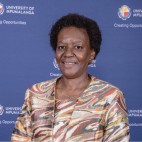The high dropout rate among black South African students has been a concern in education circles for many years – but a novel approach by the University of Johannesburg (UJ) in conjunction with the Centre for Coaching at the UCT Graduate School of Business has come up with a practical solution – life coaching.
Their research shows that students who are academically bright can still struggle in their studies not because of a lack of ability or academic input – but because of a lack of support on an emotional and psychological level.
This offers a fresh perspective on alarming recent research by the Human Sciences Research Council, which revealed that up to 40% of SA students drop out in their first year at university. Only 15% finish their degrees in the specified time and black students make up the biggest percentage of dropouts.
In many top professions – like medicine, engineering and chartered accountancy - black membership is extremely low. The South African Institute of Chartered Accountants (SAICA), for example, noted recently that despite numerous initiatives and bursary programmes to boost black membership only 24% of chartered accountants living in SA are black.
The UJ research targeted chartered accounting bursary students in their final year and set out to establish whether an innovative life coaching project could help improve academic throughput. They invited third-year CA students, who were all holders of a Thuthuka bursary, to participate in the project on a voluntary basis.
“Students are trained extremely well technically, but not much has been done to date in order to help them cope with their own unique issues and problems on a personal level,” said Erica Du Toit, senior lecturer in the Department of Accountancy in UJ’s Faculty of Economic and Financial Sciences Department.
“We believe that by teaching students the ability to self-correct and self-regulate within each of their unique life contexts, a well-rounded student with leadership abilities, ethics and a drive for life-long learning can emerge,” says Du Toit. “So we wanted to test this belief.”
Their results speak for themselves. Of the 27 students who had coaching, 78% gained admission to the prestigious CA honours programme. Only 62% of the students who chose not to receive coaching managed to qualify. The combined rate of students admitted into the honours class in 2012 was 72% - a 30% improvement on last year.
Each student underwent a personalised coaching programme which consisted of 10 individual sessions with their selected coach over a period of three months. Thuthuka students all had strong academic potential, but came from rural, underperforming schools and from families with severe financial needs. Research has shown that there is a link between low socio-economic status and low academic achievements. More than 50% of the students registered at UJ are first generation university students within their family and community, and a significant number have a low Living Standards Medium.






